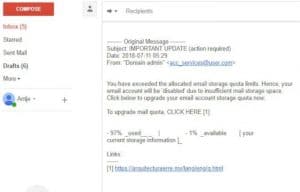Don’t Get Caught By A Phishing Scam
Phishing scams have been around for a while, but people still fall for them. These scams usually involve fraudulent email messages which appear to come from a legitimate enterprise like your internet service provider, your bank or other companies you may be doing business with. If you open those messages, they’ll direct you to a spoofed or fake website where you’ll be asked to enter some private information such as passwords, credit card numbers or other information necessary to update an account.
What Do Phishing Emails Look Like
 These phishing e-mails can come from any type of business. They can look rather primitive, just like the example you see here, or they can have a very sophisticated look. “If you get an e-mail from planetguide.com saying you were over quota and claiming you need to log into your account, know that we would never do that. We will always call you,” explains Brett Bauman, Plantguide.com owner. “We go through this all the time and unfortunately, sometimes we have to deal with the problems associated with clicking on these ads,” he added. If you take a closer look at the screen shot, you’ll notice that the link at the bottom does not even send you back to the Planetguide.com website. Always take a very close look at these suspicious e-mails.
These phishing e-mails can come from any type of business. They can look rather primitive, just like the example you see here, or they can have a very sophisticated look. “If you get an e-mail from planetguide.com saying you were over quota and claiming you need to log into your account, know that we would never do that. We will always call you,” explains Brett Bauman, Plantguide.com owner. “We go through this all the time and unfortunately, sometimes we have to deal with the problems associated with clicking on these ads,” he added. If you take a closer look at the screen shot, you’ll notice that the link at the bottom does not even send you back to the Planetguide.com website. Always take a very close look at these suspicious e-mails.
Think And Re-Read Before Hitting The SEND Button
Be smart when reading, opening and replying to emails. Make sure that you are emailing the person you are intending to email. Ask why would my friend or business partner need this information from me? Also keep in mind that companies usually will not ask via e-mail to enter your private information on their websites. When in doubt, pick up a phone and call the person and ask why. Just a few second delay in responding to one of the spear phishing emails will save you money, time, and lots of trouble.
Don’t Use Easy Passwords
We know that you have to remember your password, but don’t make it so easy that anyone can guess it. Once upon a time, back in the days when AOL and Prodigy were kings, simple passwords were not a big a problem because everyone was not on the internet. Today, everyone is on the internet as well as criminals. Create a really good password that includes unique, $<#<*, symbols with letters…NOT words or names. Plus, try to change your password a minimum of once a year. Make it a New Year’s resolution. It would be better to change your password more often then once a year, but once a year is better than never.
Ask The Experts
If you have questions or concerns or just want to learn more about what you can do for you business security, Call Planetguide.com at 504-888-5384.








